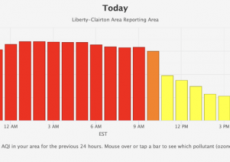For the second straight year, flu season is emerging against the backdrop of the COVID-19 pandemic. While the number of flu cases was relatively low last year, experts at Johns Hopkins Medicine say that this year, it could be much higher.
We thought that the 2020-2021 flu season would be severe, but that didn’t materialize. It’s likely that because so many people were taking infection precautions against COVID-19 last year, that translated to a lower flu transmission rate as well. Fewer flu infections last year may mean that fewer people will be immune to this year’s strains. Combined with relaxed COVID-19 precautions, that could lead to a severe 2021-2022 flu season.”
Lisa Maragakis, M.D., M.P.H., senior director of infection prevention for the Johns Hopkins Health System and associate professor of medicine at the Johns Hopkins University School of Medicine
Influenza, or the flu, is a disease caused by one of the influenza viruses that infect the respiratory tract. The disease spreads when an infected person releases particles and droplets, usually from coughs and sneezes, into the air. Symptoms can include fever, headache, body pain and chills, runny nose, sneezing, sore throat, fatigue, cough (typically dry) and general malaise. U.S. infections are highest from October to May each year, usually peaking from December to February. While most people overcome these symptoms in three to seven days, the flu can be deadly for others. Before COVID-19, between 12,000 and 56,000 U.S. deaths were attributed to flu annually.
“Like COVID-19, the flu can cause some people to get extremely sick, leading to hospitalization or even death,” says Aaron Milstone, M.D., M.H.S., associate hospital epidemiologist for The Johns Hopkins Hospital, professor of pediatrics at the Johns Hopkins University School of Medicine, and pediatric infectious disease specialist at Johns Hopkins Children’s Center. “To prevent this, it is crucial that people ages 6 months or older get the flu vaccine as soon as possible. Like all vaccines, it does not offer 100% protection from the viruses — but it can greatly reduce the severity of the illness. For this same reason, we also highly recommend that all eligible people get the COVID-19 vaccine.”
Some groups of people are at higher risk of severe flu infections, including children younger than age 2, people who are immunocompromised and people with health factors such as asthma, obesity, diabetes, neurologic conditions and diseases of the blood, lungs, heart, kidney and liver. Adults age 65 and older are also at higher risk and are encouraged to ask their doctor or pharmacist about receiving a high dose flu vaccine, which provides better protection against serious infection for older people.
While the flu and COVID-19 are caused by different viruses, they spread in similar ways. “People can use the same prevention measures to guard themselves against both illnesses,” says Maragakis. “These include washing your hands frequently, wearing face masks, practicing physical distancing, and getting vaccinated with both the COVID-19 and flu vaccines.”
Because influenza viruses mutate every year, the flu vaccine is updated annually to provide protection from the anticipated strains. According to the Centers for Disease Control and Prevention, it is safe to get a flu vaccine and a COVID-19 vaccine at the same time.
People who are allergic to components of the flu or COVID-19 vaccines are encouraged to consult their doctor and find alternative forms of protection.



































